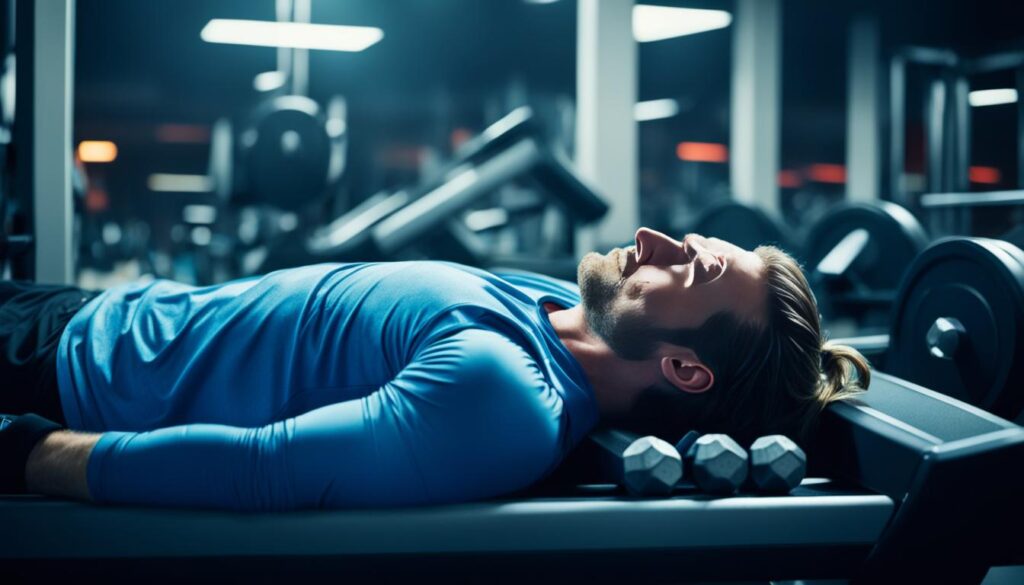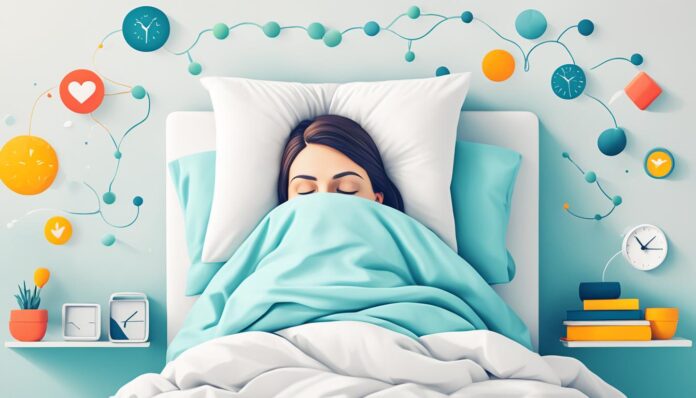Are you sacrificing sleep to squeeze in more exercise or work? While it may seem like a necessary trade-off, the truth is that quality sleep is just as crucial for your fitness and overall well-being as your diet and workout routine1. So, what’s the real impact of sleep deprivation, and how can prioritizing shut-eye give your health and fitness a serious boost?
Key Takeaways
- Adequate, quality sleep is essential for exercise performance, recovery, and overall health.
- Sleep deprivation can impair muscle strength, endurance, and increase the risk of sports injuries1.
- Regular exercise can improve sleep quality and duration, but the timing of workouts matters2.
- Chronic sleep loss is linked to a higher risk of chronic diseases like diabetes, heart disease, and obesity1.
- Improving sleep hygiene, such as limiting late-night eating and avoiding caffeine, can optimize fitness and health2.
The Connection Between Diet, Exercise, and Sleep
Maintaining a healthy lifestyle requires a careful balance of three key elements: diet, exercise, and sleep. These three factors are interconnected and play a crucial role in our overall physical and mental well-being3.
Importance of Diet
A nutritious, balanced diet can have a significant impact on our health. Eating a variety of whole, unprocessed foods can help reduce the risk of chronic diseases such as heart disease, type 2 diabetes, and certain types of cancer4. Furthermore, a healthy diet can also contribute to improved mental health and overall well-being4.
Benefits of Exercise
Regular physical activity offers numerous benefits for our physical and mental health. Exercise can help prevent high blood pressure, improve mood, and reduce the risk of developing conditions like stroke, depression, and anxiety3. Engaging in at least 150 minutes of moderate aerobic activity per week, as recommended by the U.S. Department of Health and Human Services, can provide significant health benefits3. Strength training exercises for all major muscle groups at least twice a week are also essential for overall health and fitness3.
Effects of Sleep
Sleep plays a crucial role in our overall health and well-being. Adequate sleep duration, typically between seven and nine hours per night for adults, is essential for optimal physical and cognitive function5. Poor sleep is linked to a higher prevalence of heart disease risk factors, such as obesity, type 2 diabetes, and high blood pressure, as well as decreased physical activity levels5.
By integrating a healthy diet, regular exercise, and sufficient sleep, individuals can achieve the greatest benefits for their overall fitness and well-being. This holistic approach can lead to improved weight management, mental health, and reduced risk of chronic diseases354.
The connection between diet, exercise, and sleep is a crucial aspect of maintaining a healthy lifestyle. By addressing these three interconnected elements, individuals can optimize their physical and mental well-being, leading to improved fitness, weight management, and overall health354.
Sleep is Crucial for Fitness Success
Adequate sleep is fundamental for achieving fitness goals and maximizing the benefits of exercise. Sleep importance cannot be overstated, as it plays a vital role in the body’s recovery, energy conservation, and muscle repair processes6. Studies have shown that extending sleep duration to 10 hours per night can lead to significant improvements in athletic performance, including enhanced sprint speeds, shooting accuracy, and overall physical and mental well-being.
Sleep deprivation, which affects over 30% of Americans, can have a detrimental impact on fitness goals and athletic performance6. Decreased serve accuracy, reduced sprint times, quicker exhaustion, and impaired reaction times are just some of the negative effects that can result from lack of sleep. Additionally6, middle and high school athletes with chronic sleep deprivation are at an increased risk of sports-related injuries, underscoring the importance of adequate sleep for injury prevention.
Growth hormone, a crucial hormone for muscle growth and repair, is produced primarily during sleep6. Without sufficient sleep, the body’s ability to recover and build muscle after a workout is severely compromised, undermining the hard work and dedication put into exercise. Prioritizing sleep is essential for maximizing the benefits of your fitness routine and achieving your fitness goals.
“Sleep is the foundation of physical and mental recovery, and without it, the benefits of exercise are significantly reduced.” – Dr. Cheri Mah, sleep researcher at the University of California, San Francisco.
While the recommended sleep duration for adults is 7-8 hours per night7, studies have shown that many athletes tend to sleep less, with an average of 6.55 hours per night. This lack of sleep can have far-reaching consequences, including poor sleep quality, excessive daytime sleepiness, and decreased athletic performance7.
Prioritizing sleep is crucial for achieving fitness goals and optimizing athletic performance. By making sleep a priority and incorporating evidence-based strategies to improve sleep quality, athletes and fitness enthusiasts can unlock the full potential of their training and reach new heights in their fitness journey8.
Sleep Gives Your Body Time to Recover
Adequate sleep plays a crucial role in allowing the body to recover and rebuild after exercise. During sleep, the body produces growth hormone, which is essential for repairing and strengthening muscle tissue9. Growth hormone levels peak during the deep, slow-wave stages of sleep9. Without sufficient sleep, the body is unable to properly recover and rebuild muscle, which can impair athletic performance and progress9.
Growth Hormone and Athletic Recovery
Sleep is vital for athletic recovery and performance9. Adequate sleep, often 7-9 hours per night for adults10911, allows the body to produce growth hormone, which is essential for muscle repair and growth9. This hormone helps build and strengthen muscle tissue, enabling athletes to recover more effectively and reach their fitness goals9.
Studies show that lack of sleep can have detrimental effects on athletic performance and recovery9. Chronic sleep deprivation is linked to an increased risk of health issues such as obesity, heart disease, diabetes, and certain types of cancer9. Ensuring sufficient sleep duration and quality is crucial for allowing the body to fully recover and adapt to exercise, enabling athletes to reach their fitness potential9.
“Sleep is the golden chain that ties health and our bodies together.”
– Thomas Dekker
By prioritizing sleep, athletes can optimize their recovery, boost their athletic performance, and ultimately achieve their fitness goals9. Consistent sleep schedules, avoiding intense workouts close to bedtime, and minimizing blue light exposure can all contribute to improving sleep quality and enhancing the body’s ability to recover9.
| Sleep Duration Recommendations | Age Group |
|---|---|
| 16 hours per day | Babies |
| At least 10 hours per night | Young children |
| At least 9 hours per night | Teenagers |
| 7 to 8 hours per night | Adults |
By prioritizing sleep recovery, athletes can optimize their muscle recovery and athletic performance, ultimately helping them achieve their fitness goals10911.
Exercise Can Help Improve Sleep
Regular exercise has been shown to have a positive impact on both sleep quality and duration. Physical activity creates more adenosine, a chemical in the brain that makes us feel sleepy.12 The harder we exercise, the more adenosine is produced, driving the body’s need for sleep12. Exercise also helps maintain a healthy circadian rhythm, priming the body for better sleep at night13.
While high-intensity exercise close to bedtime may delay sleep onset12, moderate exercise throughout the day or evening can improve sleep quality and efficiency12. In fact, a 2021 review found that regular physical activity improves sleep patterns in adults with insomnia and obstructive sleep apnea symptoms13. Additionally, a 2020 randomized controlled trial showed that high-intensity interval training may improve sleep quality for middle-aged adults with low physical activity levels13.
Exercise Creates More Adenosine in the Brain
The more we exercise, the more adenosine our bodies produce, which in turn makes us feel sleepy.12 This increase in adenosine levels can help us fall asleep faster and experience better quality sleep throughout the night12. Furthermore, a 2021 study suggested that exercising vigorously in the evenings might enhance slow-wave sleep, improving overall sleep quality13.
While the relationship between high-quality sleep and physical activity levels is established, research has not definitively proven that better sleep leads to an increase in physical activity levels12. However, it is clear that incorporating regular exercise into your routine can have a significant positive impact on your sleep patterns and overall sleep health13.
“Exercise relieves stress and anxiety, building sleep pressure and altering body temperature to regulate the sleep/wake cycle.”14
In conclusion, making exercise a consistent part of your lifestyle can be a powerful tool for improving your sleep quality and duration. By understanding the connection between exercise and adenosine production, you can optimize your workout routine to support better sleep and overall health121314.
The Importance of Sleep for Fitness and Overall Health
Quality sleep is crucial for maintaining optimal fitness and overall health. Adequate, restorative sleep allows the body to recover, repair, and rebuild after exercise15. This process is essential for muscle growth, injury prevention, and enhanced physical performance15.
Sleep plays a vital role in regulating hormone levels, including the production of growth hormone and testosterone, which are essential for muscle repair and recovery15. Lack of sleep can impair physical abilities like coordination, reaction time, and accuracy in performing complex movements, leading to decreased performance and increased risk of injury15.
Beyond its impact on fitness, sleep is also crucial for maintaining overall health15. Chronic sleep deprivation has been linked to a range of health problems, such as obesity, diabetes, cardiovascular disease, and depression15. Prioritizing good-quality sleep is essential for long-term well-being and disease prevention.
To optimize sleep for fitness and health, it’s important to create a comfortable sleep environment, maintain consistent sleep and wake times, and engage in relaxing bedtime routines15. Napping can also aid in fitness and athletic performance by reducing fatigue, enhancing alertness, and improving mood, as long as it doesn’t impact nighttime sleep quality15.
Professional athletes, such as Serena Williams, LeBron James, and Tom Brady, recognize the importance of sleep for their performance and recovery16. They prioritize getting at least 7-9 hours of sleep each night to support their fitness and overall health16.
In conclusion, the importance of sleep for fitness and overall health cannot be overstated. Adequate, quality sleep is essential for muscle recovery, hormone regulation, injury prevention, and optimal physical and cognitive performance. By prioritizing good sleep habits, individuals can enhance their fitness, well-being, and long-term health.
“Sleep is as important to athletic performance as diet and training. If you want to be a better athlete, you need to make sleep a priority.”
– Matthew Walker, Professor of Neuroscience and Psychology, UC Berkeley
Not Getting Enough Sleep Affects Exercise Performance
Adequate sleep is a crucial component for maximizing fitness and exercise performance. Unfortunately, sleep deprivation, even after just one night, can have a significant negative impact on an individual’s endurance and aerobic performance17.
Studies have shown that sleep-deprived individuals tend to fatigue more quickly during exercise, despite the fact that their physiological responses to exercise may not be directly affected17. This can undermine the benefits of exercise and make workouts feel more difficult, potentially undermining fitness goals.
The major metabolic changes associated with sleep deprivation, such as increased insulin resistance and decreased glucose tolerance, may partially explain the reduction in observed time to exhaustion in sleep-deprived subjects17.
Conversely, ensuring sufficient sleep is crucial for optimizing the effectiveness of exercise. One study with the Stanford University basketball team found that increasing sleep by almost 2 hours per night resulted in a 5% increase in speed, 9% more accurate free throws, faster reflexes, and improved mood18.
Heart rate variability (HRV), a key biomarker of exercise performance and recovery, is also significantly affected by lack of sleep. High HRV indicates flexibility in the cardiovascular system, readiness for exercise, and dominance of the parasympathetic nervous system, while low HRV suggests increased stress, activation of the sympathetic nervous system, and potential performance decrements19.
To maximize the benefits of exercise and maintain fitness, it is essential to prioritize getting enough quality sleep, typically 7 to 9 hours per night for athletes in training18. Consistent sleep schedules, reducing alcohol and caffeine intake, and establishing a bedtime routine can all contribute to improved sleep quality and, consequently, enhanced exercise performance1819.

In summary, not getting enough sleep can have a significant detrimental effect on exercise performance, endurance, and overall fitness. By prioritizing proper sleep, athletes and fitness enthusiasts can maximize the benefits of their training and achieve their fitness goals more effectively.
Sleep or Exercise: Which Takes Priority?
When it comes to prioritizing between sleep and exercise, the answer may not be as straightforward as it seems. Ideally, both should be equally important for achieving optimal health and fitness. However, when time is limited, sleep should take precedence, especially if sleep deprivation has been an ongoing issue20.
Without sufficient sleep, the body is unable to properly recover and adapt to exercise, undermining the benefits of physical activity. Skipping a workout is often better than skipping sleep, as sleep-deprived individuals tend to have poorer exercise performance and an increased risk of injury20. While exercise is crucial for overall health, getting the recommended 7-8 hours of sleep per night should be the primary focus for improving fitness and well-being20.
According to experts, the health benefit ratio, factoring in sleep, diet, and exercise, is 60% sleep, 30% diet, and 10% exercise21. This underscores the importance of prioritizing sleep, as it plays a crucial role in supporting the body’s overall health and fitness goals.
That said, regular exercise is also essential for maintaining a healthy lifestyle. The American College of Sports Medicine recommends at least 150 minutes of moderate exercise or 75 minutes of intense exercise per week21. Incorporating exercise into daily activities, such as running up stairs at home, can help individuals save time and fit in physical activity without sacrificing sleep20.
It’s important to use common sense when balancing sleep and exercise, especially for individuals with time constraints or young children at home20. Sacrificing sleep for exercise can lead to weight gain, cardiovascular disease, diabetes, and other health issues21. Regular exercise, on the other hand, can promote sounder sleep and provide a multitude of health benefits21.
Individuals should also be cautious about exercising during their biological night, as it could be counterproductive for muscle performance and recovery21. By prioritizing sleep and incorporating exercise into daily routines, individuals can achieve a healthy balance that supports their overall fitness and well-being.
| Factor | Percentage Impact |
|---|---|
| Sleep | 60% |
| Diet | 30% |
| Exercise | 10% |
“Making small changes in diet, such as reducing sugar-loaded drinks, can have a significant impact on health.”21
Key Takeaways:
- When time is limited, prioritize sleep over exercise, as sleep deprivation can negatively impact exercise performance and recovery.
- Incorporate exercise into daily activities to save time, but be cautious about high-intensity workouts in the evening as they may disrupt sleep.
- Maintain a healthy balance of proper sleep, nutritious diet, and regular exercise, as these three elements are equally essential for overall well-being.
Improving Sleep Through Diet and Exercise
Achieving better sleep quality and duration can be accomplished through strategic lifestyle changes. By carefully managing your diet and exercise routine, you can create an environment that encourages more restful and restorative sleep232425.
Do Not Eat Too Late
Consuming large meals or snacks too close to bedtime can disrupt your body’s natural sleep-wake cycle. Aim to finish your last meal of the day at least 2-3 hours before you plan to go to sleep25. Skipping meals, snacking excessively, or eating too much right before bed can all contribute to poorer sleep quality and quantity25.
Avoid Caffeine
Caffeine is a stimulant that can interfere with your ability to fall asleep and stay asleep. It’s best to avoid consuming caffeinated beverages, such as coffee, tea, or soda, within 2-3 hours of your desired bedtime25. Caffeine can persist in the body for several hours, so being mindful of your intake throughout the day is crucial for supporting healthy sleep.
Move Your Body
Regular physical activity during the day can have a positive impact on your sleep. Studies have shown that physical exercise increases adenosine levels in the brain, promoting sleepiness and better sleep quality2324. Engaging in moderate aerobic exercise, such as walking, jogging, or swimming, can lead to improved sleep the same night24. However, it’s important to time your exercise appropriately, as working out too close to bedtime may have the opposite effect for some individuals24.
Get Natural Light
Exposure to natural light, particularly in the morning, can help regulate your body’s circadian rhythm and improve sleep quality25. Spending time outdoors or near windows during the day can cue your body to better prepare for sleep in the evening. Maintaining a consistent sleep-wake schedule and prioritizing exposure to natural light can have a positive impact on your overall sleep hygiene.
By incorporating these sleep-promoting habits into your daily routine, you can create an environment that supports better sleep, which in turn benefits your fitness goals and overall health232425.

“Choosing an exercise that one enjoys can contribute to better adherence and ultimately better sleep quality.”24
| Sleep-Promoting Habit | Benefit |
|---|---|
| Avoiding late-night meals | Supports the body’s natural sleep-wake cycle |
| Limiting caffeine intake | Prevents disruptions to falling and staying asleep |
| Engaging in regular exercise | Increases adenosine levels for better sleep quality |
| Exposing yourself to natural light | Regulates the body’s circadian rhythm for improved sleep |
By incorporating these sleep-promoting habits into your daily routine, you can create an environment that supports better sleep, which in turn benefits your fitness goals and overall health232425.
Recommended Sleep Duration for Adults
Achieving the recommended sleep duration is crucial for maintaining overall health and well-being. According to sleep experts, most healthy adults require 7-8 hours of sleep per night for optimal health and performance26. However, a concerning trend has emerged, with over 30% of Americans not getting the recommended amount of sleep2728.
Insufficient sleep has been linked to a variety of adverse health consequences. From increased risk of chronic diseases like obesity, heart disease, and type 2 diabetes, to impaired cognitive function, reduced immunity, and elevated inflammation, the impact of poor sleep can be far-reaching2627.
The consequences of sleep deprivation are not limited to physical health. Lack of sleep can also lead to mood changes, impaired judgment, and reduced attention span, all of which can impact an individual’s overall quality of life and ability to achieve their fitness goals26.
Prioritizing proper sleep duration is crucial for maintaining physical and mental wellbeing, as well as achieving fitness objectives. By establishing a consistent sleep schedule, maintaining a bedtime routine, and creating a sleep-conducive environment, individuals can optimize their sleep quality and duration, ultimately enhancing their overall health and performance28.
| Recommended Sleep Duration for Adults | Potential Consequences of Sleep Deprivation |
|---|---|
| 7-9 hours per night |
|
By prioritizing adequate sleep duration and implementing healthy sleep habits, individuals can unlock the full benefits of their fitness journey and achieve overall well-being262728.
“Adequate sleep is not just a luxury, but a necessity for optimal health and performance. Prioritizing sleep should be an integral part of any fitness regimen.”
Sleep and Muscle Recovery
Adequate sleep is crucial for optimal muscle recovery and growth. During sleep, the body produces growth hormone, which is essential for repairing and building muscle tissue29. The National Sleep Foundation recommends adults get between 7 and 9 hours of sleep per night for optimal recovery from exercise29. Increasing sleep time by just one hour per night is equivalent to having an extra night’s worth of sleep over a week29. Growth hormone, crucial for tissue repair, is primarily produced during stage 3 of non-rapid eye movement (NREM) sleep, emphasizing the importance of adequate sleep for muscle regeneration.
Without sufficient sleep, the body is unable to fully recover and adapt to exercise, potentially leading to decreased muscle strength and endurance29. One gram of glycogen in muscle cells can store three to four grams of water. This process occurs during sleep, contributing to muscle growth and recovery29. Insufficient sleep can lead to higher levels of catabolic hormones, hindering tissue repair and muscle growth29. Missing out on sleep can result in heightened sympathetic nervous system activity and elevated cortisol levels, impacting muscle growth and overall exercise performance.
Ensuring sufficient sleep duration and quality is vital for athletes and fitness enthusiasts to maximize the benefits of their training and reach their performance goals29. Inadequate sleep can cause a delay in reflexes, poor judgement, and increase the risk of training injuries, highlighting the importance of sleep for exercise safety29. Outside of traumatic injury, illness is the second leading cause of missed playing time for athletes, emphasizing the crucial role of sleep in promoting immune function29. Overtraining due to excessive exercise and insufficient sleep can hinder fitness goals, potentially leading to injuries that impede physical activity.
Planning workouts based on the quality of sleep one can achieve can optimize exercise performance, with high-intensity workouts best scheduled following nights of ample rest29.

| Key Benefits of Sleep for Muscle Recovery | Supporting Evidence |
|---|---|
| Sleep is crucial for muscle recovery and aids in the repair and recovery of damaged tissues. | 30 |
| Lack of sleep can impair both muscular endurance and strength, leading to performing fewer repetitions and lifting less weight. | 30 |
| Sleep deprivation can delay muscle recovery, increase the risk of injury, and reduce muscle growth. | 30 |
| Getting 7-9 hours of sleep per night is important for quality muscle recovery, but individual needs may vary based on lifestyle and training intensity. | 30 |
| Minimal sleep (less than six hours) over four days can negatively impact muscle recovery. | 30 |
| Good sleep quality is associated with greater muscle strength, while short sleep duration may decrease muscle strength. | 30 |
| Human growth hormone (HGH) release during sleep stimulates protein synthesis, aiding in muscle repair and growth. | 30 |
| Sleep helps regulate hormones like testosterone important for muscle recovery and promotes inflammation reduction. | 30 |
| Muscle relaxation during sleep allows for muscle recovery and release of tension. | 30 |
| Replenishment of muscle glycogen and restoration of energy sources occur during quality sleep, contributing to muscle recovery. | 30 |
| Sleep and muscle growth are closely linked, with studies showing that sleep deprivation can lead to loss of muscle mass. | 30 |
The importance of sleep for muscle recovery and athletic performance is well-documented31. One night of sleep deprivation decreases treadmill endurance performance31. Sleep interventions have been designed to improve athletic performance and recovery31. Effects of one night’s sleep deprivation on anaerobic performance the following day have been studied31. Trends and factors associated with insomnia and sleep apnea in all United States military service members from 2005 to 2014 have been analyzed31. The acute effects of twenty-four hours of sleep loss on the performance of national-caliber male collegiate weightlifters were investigated31. Altered sleep-wake cycles have been linked to physical performance in athletes31. The role of a short post-lunch nap in improving cognitive, motor, and sprint performance in participants with partial sleep deprivation has been explored.
“Ensuring sufficient sleep duration and quality is vital for athletes and fitness enthusiasts to maximize the benefits of their training and reach their performance goals.”
Impact of Sleep on Weight and Obesity
Adequate, quality sleep is a crucial factor in maintaining a healthy weight and preventing obesity. Research has shown that sleep deprivation can have a significant impact on the body’s hormones that regulate appetite, leading to increased hunger and cravings for unhealthy, high-calorie foods.32 Sleep-deprived individuals are also more likely to make poorer dietary choices and be less physically active during the day32.
Chronic sleep loss has been linked to a higher risk of obesity and other metabolic disorders32. For instance, children who do not get enough sleep increase their risk of becoming overweight or obese.32 Additionally, children who go to bed later have worse diet quality, consuming more nutrient-poor foods and fewer fruits and vegetables compared to those who go to bed earlier.32
The connection between sleep and weight management is further highlighted by the fact that obesity is seven times more common in individuals with obstructive sleep apnea, a condition that can disrupt sleep.32 Furthermore, obesity increases the risk of developing conditions like gastroesophageal reflux disease (GERD) and asthma, which can also contribute to sleep disturbances.32
Interestingly, exercise can improve sleep quality and reduce symptoms in conditions like obstructive sleep apnea, independent of weight loss.32 Similarly, maintaining a balanced diet can potentially improve sleep quality.32 By prioritizing adequate, quality sleep along with a healthy diet and regular exercise, individuals can better manage their weight and reduce the risk of obesity-related health issues323334.
“Sleep loss is associated with growth hormone deficiency and elevated cortisol levels, both linked to obesity.”32
The impact of sleep on weight and obesity is a complex and multifaceted issue. Numerous studies have highlighted the various ways in which sleep deprivation can contribute to weight gain and obesity3334.
- Restricted sleep duration causes a greater tendency to select high-calorie foods, increasing the risk of weight gain32.
- Adults not getting sufficient sleep engage in less exercise compared to those who do, possibly due to sleepiness and fatigue during the day32.
- Obstructive sleep apnea, a condition that can disrupt sleep, is seven times more common in individuals who are obese32.
- Obesity increases the risk of developing conditions like gastroesophageal reflux disease (GERD) and asthma, which can also contribute to sleep disturbances32.
To maintain a healthy weight and prevent obesity, it is essential to prioritize quality sleep, in addition to a balanced diet and regular exercise323334.
Sleep Disorders and Exercise
Maintaining a healthy sleep schedule is crucial for overall fitness and well-being, but for some individuals, sleep disorders can pose a significant challenge35. Research conducted in the United Kingdom included over 92,000 adults between 40 and 73 years old, and participants were monitored over a period spanning from 2013 to 2015 to track exercise and sleep patterns35. The findings revealed that regular exercise was associated with reduced risk of death, even in cases where individuals slept less than six hours per night35. Completing 150 minutes of moderate or vigorous physical activity per week was highlighted as potentially offsetting health risks related to inadequate sleep35. Engaging in physical activity, such as short walks or stationary bike rides, was recommended as beneficial even in small doses.
Insomnia and Exercise
Individuals struggling with insomnia often find it difficult to fall asleep or stay asleep, leading to daytime fatigue and reduced exercise performance36. Research has shown that sleeping less than six hours a night harms more than just the brain for most people, as it is linked with a fivefold increased risk for stroke and double the risk for heart disease and death when combined with other common conditions like diabetes or high blood pressure36. However, studies have demonstrated that exercise can be as effective as prescription sleep medication in improving sleep quality37. Physical activity increases the body’s sleep drive, promoting better sleep at night, and the brain’s release of feel-good chemicals during exercise can combat stress and anxiety, which can contribute to insomnia.
Sleep Apnea and Exercise
Sleep apnea is a condition characterized by interrupted breathing during sleep, which can impair exercise capacity and recovery36. People with higher levels of physical activity and who slept between six and eight hours per night had better cognitive function as they aged, while being less physically active and sleeping poorly were independently associated with worse cognitive performance over time36. Engaging in regular exercise has been shown to help improve the symptoms of sleep apnea, underscoring the importance of addressing both sleep and physical activity for overall health.
Restless Legs Syndrome and Exercise
Restless legs syndrome, a condition that causes an uncomfortable urge to move the legs, can disrupt sleep and negatively affect exercise routines36. Sleeping less than six hours a night was linked with a faster rate of cognitive decline over time, and highly active people in their 50s and 60s who slept on average less than six hours a night had the same cognitive levels as people who didn’t exercise after 10 years36. However, research has shown that regular exercise can help improve the symptoms of restless legs syndrome, providing a potential avenue for managing this sleep disorder.
In conclusion, addressing sleep disorders and incorporating regular exercise can have a significant impact on overall fitness and health. By understanding the connections between sleep, exercise, and conditions like insomnia, sleep apnea, and restless legs syndrome, individuals can take proactive steps to optimize their sleep and physical activity for long-term well-being.
Timing of Exercise and Sleep
The timing of your exercise routine can have a significant impact on your sleep quality and duration. Incorporating exercise into your daily life is crucial for overall health, but strategically planning when you work out can further optimize the benefits for your sleep cycle and circadian rhythm.
Morning or Afternoon Exercise
Research suggests that morning workouts can help establish a fitness routine, leading to more consistency in exercising38. Morning exercise may improve the sleep cycle by shifting the circadian rhythm, resulting in better alertness in the morning and earlier bedtime38. Exercising on an empty stomach in the morning (fasted state) can burn more fat compared to working out after a meal (fed state)38. Studies indicate that the afterburn effect from morning workouts may contribute to long-term weight loss38. Morning workouts can enhance productivity throughout the day, improving energy levels, focus, and decision-making38. Exercise in the morning has been linked to boosted mood due to the release of endorphins and a sense of accomplishment38.
On the other hand, evening workouts have shown to improve physical performance, muscle strength, flexibility, power output, and endurance compared to morning workouts38. Hormone production during afternoon and evening workouts may favor greater strength and muscle gains, particularly in testosterone levels38. Exercising at night can serve as a stress-reliever, aiding in combating stress and promoting relaxation before bedtime38. Nighttime exercise may help replace unhealthy habits like snacking, drinking, or smoking, by introducing a positive alternative38.
Evening Exercise
While the myth suggests that evening workouts can interfere with sleep, research shows it might not affect everyone equally, with mild to moderate exercise possibly having beneficial effects on sleep quality38. Sleep experts recommend exercising at least two or three hours before bedtime to avoid restless nights39. For individuals 65 and older, regular exercise of about 30 minutes most days improves sleep quality39. Studies suggest that exercise significantly improves sleep for people with chronic insomnia, helping them fall asleep faster, sleep longer, and enjoy better sleep39. Family physician Christopher Lauricella, DO, recommends a minimum of 45 minutes of aerobic exercise daily for better sleep quality39. A good night’s sleep can boost the desire to exercise and positively affect various aspects of life according to Dr. Lauricella39.
Ultimately, the optimal timing of exercise depends on individual differences, personal preferences, and specific health considerations. Experimenting with different exercise schedules can help individuals find the routine that supports both their fitness goals and sleep quality.
It’s essential to listen to your body’s response to different exercise timing and make adjustments accordingly. Maintaining a consistent exercise routine and being mindful of your sleep patterns can significantly improve your overall health and well-being383940.
Conclusion
The importance of sleep for fitness and overall health cannot be overstated. Adequate, quality sleep allows the body to recover, repair, and rebuild after exercise, enabling individuals to maximize the benefits of their physical activity. Recent estimates suggest that 60 percent of middle schoolers and 70 percent of high schoolers don’t get adequate sleep on school nights, with Michigan high schoolers facing an 80 percent sleep deprivation rate41 Without sufficient sleep, exercise performance, motivation, and safety can be impaired.
Sleep also plays a vital role in maintaining a healthy diet, managing weight, and reducing the risk of chronic diseases. More than 35 percent of people are sleep deprived, with 1 in 3 individuals not getting adequate sleep regularly42 Improving sleep through proper sleep hygiene, such as avoiding late-night eating, limiting caffeine, and getting regular exercise, is crucial for optimizing fitness and overall wellbeing. An American Academy of Sleep Medicine position statement emphasizes the essential nature of sleep for health and well-being43
By prioritizing both sleep and exercise, individuals can achieve their fitness goals and maintain long-term health and wellness. The connection between adequate sleep, nutrition, physical activity, and the benefits of physical therapy is underscored as a way to maximize health outcomes for individuals43. With a holistic approach that balances these crucial elements, people can unlock the full potential of their physical and mental well-being.
FAQ
What is the importance of sleep for fitness and overall health?
How are diet, exercise, and sleep interconnected?
Why is sleep vital for fitness success?
How does sleep help the body recover after exercise?
How can exercise improve sleep quality and duration?
How does lack of sleep impact exercise performance?
Should sleep or exercise take priority when time is limited?
How can you improve sleep quality and duration?
What is the recommended sleep duration for adults?
How does sleep impact muscle recovery and growth?
How does sleep deprivation affect weight and obesity?
How do sleep disorders affect exercise and fitness?
How does the timing of exercise impact sleep?
Source Links
- The Connection Between Diet, Exercise, and Sleep
- How Sleep Affects Fitness
- 7 great reasons why exercise matters
- 8 myths about diet, exercise and sleep | CNN
- Sleep may be just as important to heart health as diet and physical activity, research finds | CNN
- Sleep, Athletic Performance, and Recovery
- Sleep and Athletic Performance: Impacts on Physical Performance, Mental Performance, Injury Risk and Recovery, and Mental Health
- Diet, Sleep and Exercise: The Keystones of Healthy Lifestyle for Medical Students
- The Impact of Sleep on Your Fitness Progress and Performance
- The Benefits of Slumber
- Good Sleep for Good Health
- Exercise and Sleep
- Exercising for Better Sleep: 5 Reasons It Works
- Can exercise help you sleep?
- How Does Sleep Influence Fitness
- Why sleep is so important for your fitness
- Sleep deprivation and the effect on exercise performance – PubMed
- Can Sleep Improve Your Athletic Performance?
- The Surprising Way Lack of Sleep Affects Workout Performance
- Sleep vs. Exercise? (Published 2017)
- You Asked: Which is more important—sleep, diet or exercise? – Vital Record
- The Importance of Sleep for Health – American Fitness Index
- The Effect of Physical Activity on Sleep Quality and Sleep Disorder: A Systematic Review
- Exercising for Better Sleep
- Nutrition and Sleep: Diet’s Effect on Sleep
- Physical Health and Sleep
- 10 Top Benefits of Getting More Sleep
- What Is Sleep Hygiene? (And How to Make Yours the Best It’s Ever Been)
- 7 Benefits of Sleep for Exercise Recovery
- Sleep for Muscle Recovery: Why it Matters and Tips to Sleep Better
- The importance of sleep for performance and recovery
- Obesity and Sleep
- Sleep Deprivation: Effects on Weight Loss and Weight Loss Maintenance
- The association between sleep health and weight change during a 12-month behavioral weight loss intervention
- Exercise May Help Counteract the Toll of Poor Sleep (Published 2023)
- Lack of sleep blocks brain-boosting benefits from exercise, study says | CNN
- How Exercise Affects Your Sleep
- Find Out the Best Time of Day to Exercise for Your Lifestyle
- Exercise And Sleep: Timing Is Everything | Premier Health
- Exercise for better sleep: how staying active can help you rest — Calm Blog
- Sleep 101: Why Sleep Is So Important to Your Health | The Pursuit | University of Michigan School of Public Health | Adolescent Health | Child Health | Chronic Disease | Epidemic | Mental Health | Obesity
- Importance Of Sleep In Fitness
- The Importance of Sleep for Overall Health: A Comprehensive Guide



